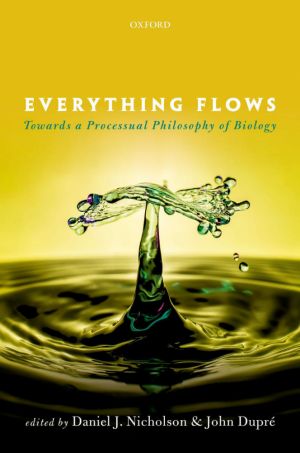Everything Flows
Towards a Processual Philosophy of Biology
by Daniel J. Nicholson, John Dupre
DescriptionTable of ContentsDetailsHashtagsReport an issue 






Book Description
Everything Flows explores the metaphysical thesis that the living world is not made up of substantial particles or things, as has often been supposed, but is rather constituted by processes. The biological domain is organised as an interdependent hierarchy of processes, which are stabilized and actively maintained at different timescales. Even entities that intuitively appear to be paradigms of things, such as organisms, are actually better understood as processes. Unlike previous attempts to articulate processual views of biology, which have tended to use Alfred North Whitehead's panpsychist metaphysics as a foundation, this book takes a naturalistic approach to metaphysics. It submits that the main motivations for replacing an ontology of substances with one of processes are to be found in the empirical findings of science. Biology provides compelling reasons for thinking that the living realm is fundamentally dynamic, and that the existence of things is always conditional on the existence of processes. The phenomenon of life cries out for theories that prioritise processes over things, and it suggests that the central explanandum of biology is not change but rather stability, or more precisely, stability attained through constant change. This edited volume brings together philosophers of science and metaphysicians interested in exploring the prospects of a processual philosophy of biology. The contributors draw on an extremely wide range of biological case studies, and employ a process perspective to cast new light on a number of traditional philosophical problems, such as identity, persistence, and individuality.This open book is licensed under a Creative Commons License (CC BY-NC-ND). You can download Everything Flows ebook for free in PDF format (23.2 MB).
Table of Contents
Chapter 1
A Manifesto for a Processual Philosophy of Biology
Chapter 2
Processes and Precipitates
Chapter 3
Dispositionalism: A Dynamic Theory of Causation
Chapter 4
Biological Processes: Criteria of Identity and Persistence
Chapter 5
Genidentity and Biological Processes
Chapter 6
Ontological Tools for the Process Turn in Biology: Some Basic Notions of General Process Theory
Chapter 7
Reconceptualizing the Organism: From Complex Machine to Flowing Stream
Chapter 8
Objectcy and Agency: Towards a Methodological Vitalism
Chapter 9
Symbiosis, Transient Biological Individuality, and Evolutionary Processes
Chapter 10
From Organizations of Processes to Organisms and Other Biological Individuals
Chapter 11
Developmental Systems Theory as a Process Theory
Chapter 12
Waddington's Processual Epigenetics and the Debate over Cryptic Variability
Chapter 13
Capturing Processes: The Interplay of Modelling Strategies and Conceptual Understanding in Developmental Biology
Chapter 14
Intersecting Processes Are Necessary Explanantia for Evolutionary Biology, but Challenge Retrodiction
Chapter 15
A Process Ontology for Macromolecular Biology
Chapter 16
A Processual Perspective on Cancer
Chapter 17
Measuring the World: Olfaction as a Process Model of Perception
Chapter 18
Persons as Biological Processes: A Bio-Processual Way Out of the Personal Identity Dilemma
Book Details
Title
Everything Flows
Subject
Philosophy
Publisher
Oxford University Press
Published
2018
Pages
403
Edition
1
Language
English
ISBN13 Digital
9780198779636
ISBN10 Digital
0198779631
PDF Size
23.2 MB
License

Related Books
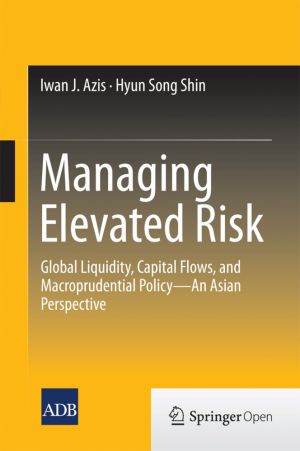
This book discusses the risks and opportunities that arise in Emerging Asia given the context of a new environment in global liquidity and capital flows. It elaborates on the need to ensure financial and overall economic stability in the region through improved financial regulation and other policy measures to minimize the emergent risks. "Man...
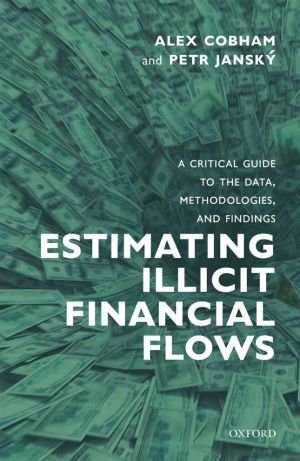
Illicit financial flows constitute a global phenomenon of massive but uncertain scale, which erodes government revenues and drives corruption in countries rich and poor. In 2015, the countries of the world committed to a target to reduce illicit flows, as part of the UN Sustainable Development Goals. But five years later, there is still no agreemen...
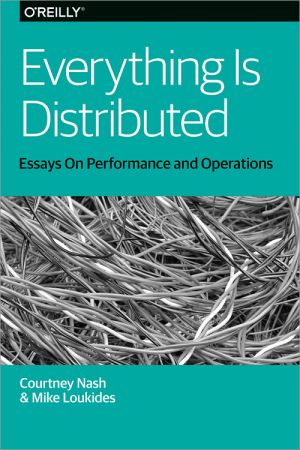
Software development has reached a point where no single developer can understand, see, or control all the component parts, whether it's technical or organizational. The Web is now the computer and it's forced even the simplest applications to become distributed.
Through five thought provoking essays, you'll discover the whys and ...
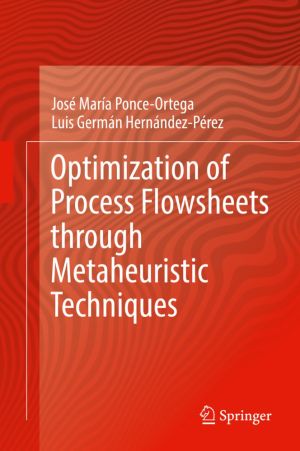
This book presents a general multi-objective optimization framework for optimizing chemical processes by implementing a link between process simulators and metaheuristic techniques. The proposed approach is general and shows how to implement links between different process simulators such as Aspen Plus, HYSIS, Super Pro Designer linked to a variety...

Intermediate Financial Accounting Volume 1 developed in collaboration by Athabasca University and Lyryx, is intended for a first course in Intermediate Financial Accounting, and presumes that students have already completed one or two Introductory Financial Accounting courses. The textbook reflects current International Financial Reporting Standard...

Intermediate Financial Accounting Volume 2 developed in collaboration by Athabasca University and Lyryx, is intended for the second of two in Intermediate Financial Accounting courses. It presumes that students have already completed the Introductory Financial Accounting, and the first Intermediate Financing Accounting course. The textbook reflects...

